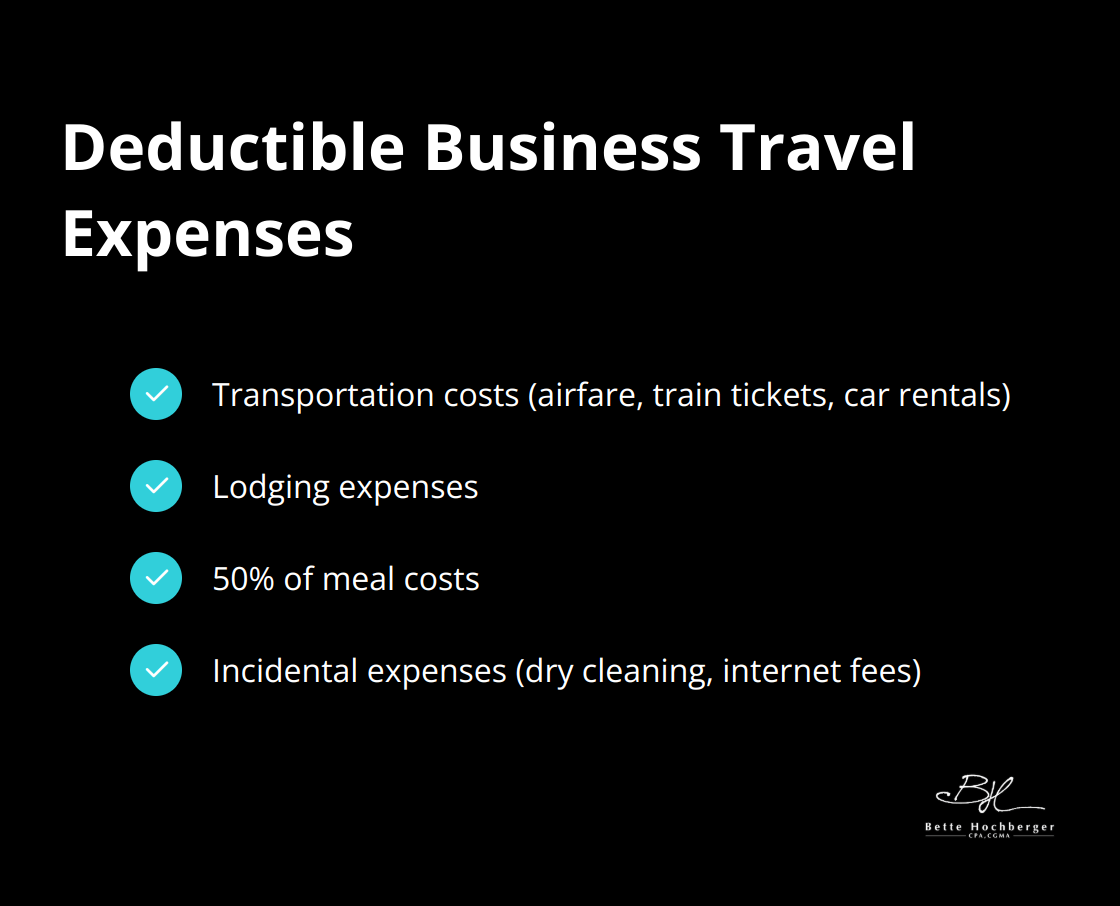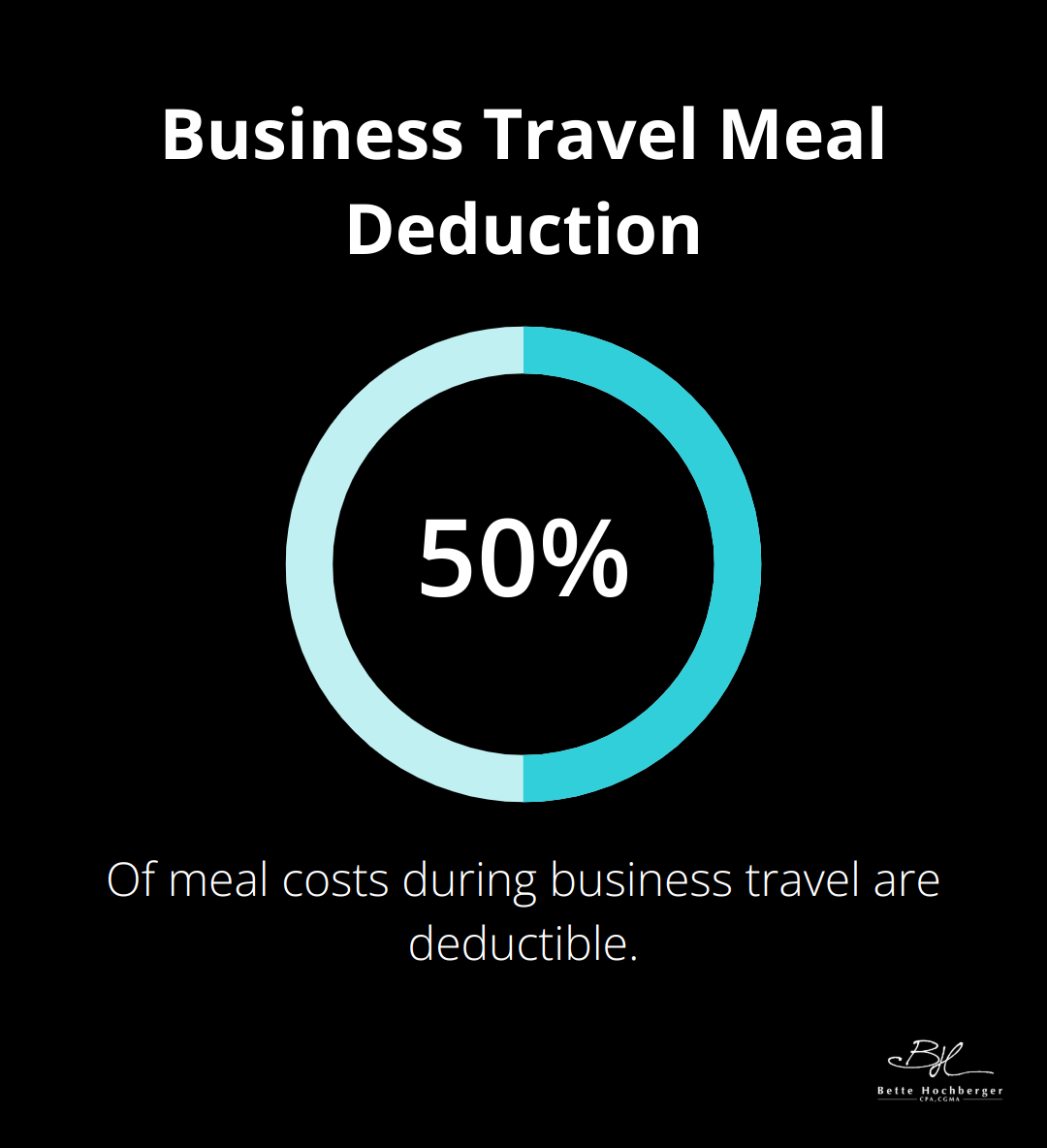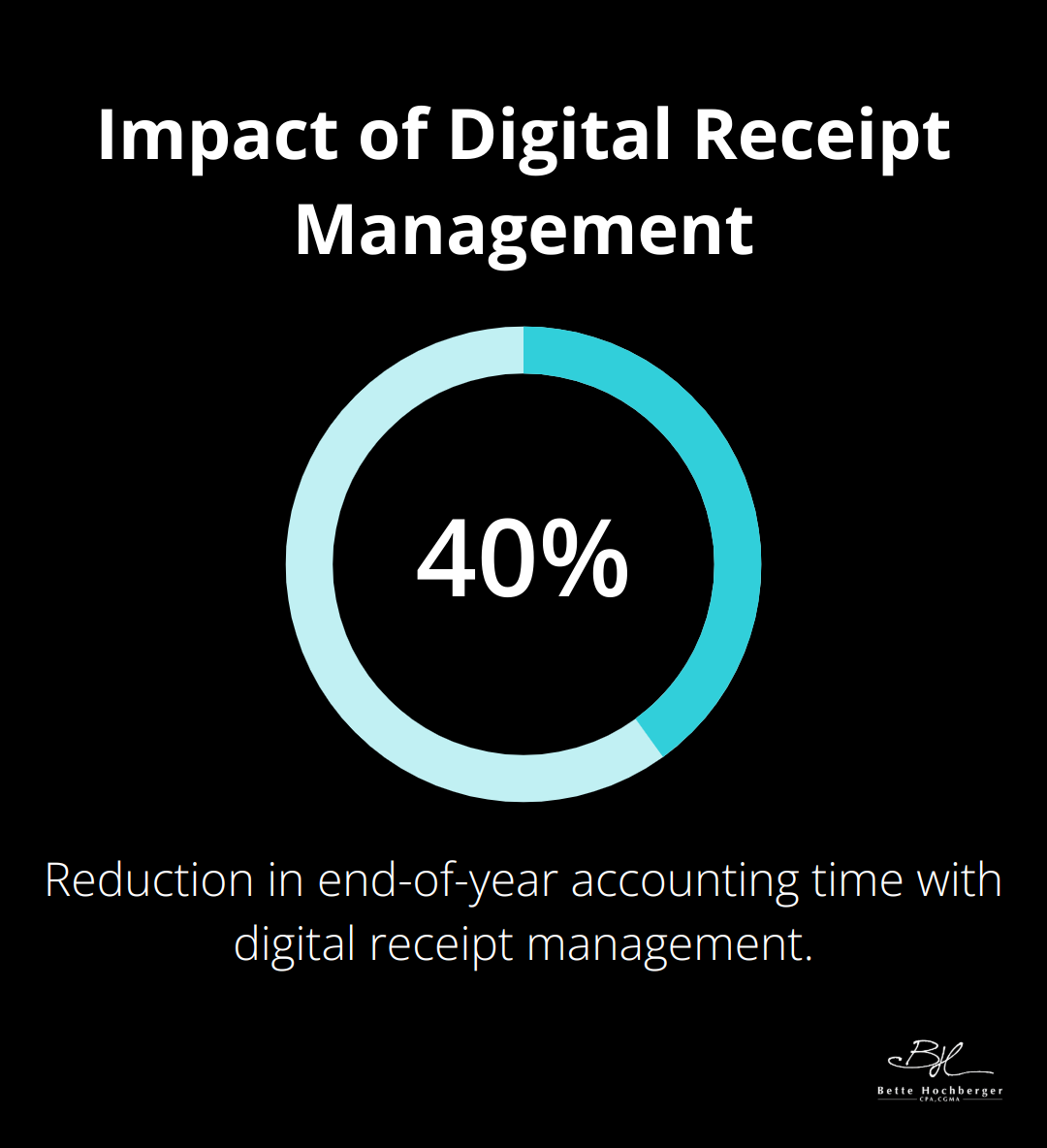Business travel expenses can be a significant cost for many companies. However, with proper understanding and documentation, these expenses can often be deducted from your taxes.
At Bette Hochberger, CPA, CGMA, we’ve seen how maximizing these deductions can lead to substantial savings for businesses. This guide will walk you through the ins and outs of deducting business travel expenses, complete with practical examples to help you navigate this complex area of tax law.
What Counts as Business Travel?
Defining Your Tax Home
Business travel extends beyond exotic destinations. It encompasses any trip you take outside your tax home for work purposes. Your tax home typically refers to your main place of business, not necessarily your residence.
The IRS sets specific criteria for business travel qualification. It generally includes travel that takes you away from your tax home for longer than an ordinary workday and requires you to sleep or rest to meet your work demands while away.
For instance, a consultant based in Miami who travels to New York for a three-day client meeting engages in business travel. However, a daily commute from Fort Lauderdale to Miami doesn’t qualify as business travel.
Types of Deductible Expenses
The list of deductible expenses is extensive. It includes:
- Transportation costs (airfare, train tickets, car rentals)
- Lodging expenses
- 50% of meal costs
- Incidental expenses (dry cleaning, internet fees)
A software developer client once successfully deducted the cost of a co-working space rental during a week-long business trip to Silicon Valley (a prime example of a legitimate business expense).

IRS Rules and Regulations
The IRS enforces strict rules and regulations for business travel expenses. Your expenses must be both ordinary and necessary for your business.
“Ordinary” means common and accepted in your trade or business. “Necessary” implies helpful and appropriate for your business. Lavish or extravagant expenses don’t qualify for deductions.
Consider this scenario: You attend a conference in Las Vegas. Staying at a standard hotel likely qualifies as ordinary and necessary. Booking the presidential suite at a luxury resort? Probably not.
It’s important to note that if you combine business with pleasure on your trip, you can only deduct expenses directly related to business. If you extend your Las Vegas trip by two days for personal time, those extra days’ expenses aren’t deductible.
Documenting Your Expenses
Proper documentation proves essential when claiming business travel deductions. The IRS requires detailed records of all expenses, including receipts, invoices, and explanations of the business purpose for each expenditure.
Consider using expense tracking apps or maintaining a detailed travel log to simplify this process. These tools can help you categorize expenses and maintain accurate records, which will prove invaluable during tax season or in case of an audit.
As we move forward, let’s explore the specific types of deductible business travel expenses in more detail. Understanding these categories will help you maximize your deductions while staying compliant with IRS regulations.
What Can You Deduct for Business Travel?
Business travel expenses can significantly impact your company’s bottom line. Knowledge of deductible expenses is essential for maximizing your tax benefits. Let’s explore the various categories of deductible expenses and how to optimize them.
Transportation Costs
Transportation often represents the largest portion of your business travel expenses. You can deduct airfare, train tickets, bus fares, and car rental costs. If you use your personal vehicle for business travel, you have two options: deduct the actual expenses or use the standard mileage rate. For 2024, the IRS standard mileage rate is 67 cents per mile for business use.
A sales representative who frequently travels across Florida saved over $5,000 in taxes last year by meticulously tracking her mileage and fuel costs. She used a smartphone app to log her trips, which made it easy to separate business and personal travel.
Lodging Expenses
Hotel stays are fully deductible as long as they’re reasonable for your business needs. This includes not just the room rate, but also taxes and mandatory resort fees. However, you should exercise caution with upgrades or luxury accommodations that the IRS might deem lavish.
A tech startup founder navigated his lodging deductions during a month-long business trip to Silicon Valley. By choosing a mid-range extended stay hotel instead of a luxury resort, he not only saved on upfront costs but also ensured all his lodging expenses were fully deductible.
Meals and Entertainment
While the rules around meals and entertainment have changed in recent years, you can still deduct 50% of your meal costs during business travel. This includes both meals you eat alone and those shared with clients or colleagues for business purposes.
It’s important to note that entertainment expenses are no longer deductible. However, meals during entertainment events can still qualify if they’re invoiced separately. For example, if you take a client to a baseball game, you can’t deduct the ticket cost, but you can deduct 50% of the hot dogs and drinks purchased at the concession stand.

Miscellaneous Expenses
Don’t overlook the smaller expenses that can add up. These include:
- Tips for hotel staff, taxi drivers, and other service providers
- Laundry and dry cleaning services for trips lasting more than a few days
- Internet and phone charges related to business activities
- Baggage fees and other airline incidentals
A fashion industry consultant deducted over $1,000 in dry cleaning expenses during her month-long trip to New York Fashion Week. These costs were necessary to maintain her professional appearance at daily events and meetings.
We recommend keeping a daily log of all expenses, no matter how small. Even a $5 tip to a bellhop can contribute to your overall deductions.
The key to maximizing your business travel deductions is meticulous record-keeping and understanding what qualifies as a legitimate business expense. In the next section, we’ll explore effective strategies for documenting your expenses and staying compliant with IRS regulations.
How to Master Business Travel Recordkeeping
Embrace Digital Receipt Management
Modern expense tracking apps have transformed business travel expense management. Apps like Expensify allow you to photograph receipts instantly, automatically categorizing and storing them for easy retrieval during tax season. A consulting industry client reduced their end-of-year accounting time by 40% after implementing a digital receipt management system. This not only saved time but also increased the accuracy of their expense reports, leading to more confident tax filings.

Create a Comprehensive Travel Log
A detailed travel log complements receipt collection. Your log should include:
- Dates of departure and return for each trip
- Destinations and the business purpose for each location
- Business activities conducted at each destination
- Mileage records if using a personal vehicle
A real estate developer uses a simple spreadsheet to track these details. He spends just five minutes each evening updating his log, which ensures a complete record of his business activities and related expenses.
Separate Business and Personal Expenses
When you mix business with pleasure, you must clearly distinguish between business and personal expenses. Use separate credit cards for business and personal purchases to create a clear paper trail. If you extend a business trip for personal reasons, be meticulous about which expenses occurred during the business portion of your trip.
One entrepreneur faced an IRS audit but passed smoothly because she had used a dedicated business credit card and maintained clear records of when her business activities ended and personal vacation began during a trip to Europe. It’s important to note that domestic transportation costs are 100% deductible, as long as the primary reason for the trip is business rather than pleasure.
Implement a Consistent System
Consistency proves key in effective recordkeeping. Establish a routine for logging expenses and stick to it. This might involve setting aside time each evening to update your records or dedicating a specific day each week to review and categorize expenses. A consistent system helps ensure no expenses slip through the cracks and makes the tax preparation process much smoother.
Leverage Cloud Storage
Cloud storage solutions (like Google Drive or Dropbox) offer a secure and accessible way to store your digital receipts and travel logs. These platforms allow you to access your records from anywhere, making it easy to update your logs on the go or provide information to your accountant when needed. Plus, cloud storage provides a backup in case of device loss or failure.
Final Thoughts
Business travel expenses can significantly impact your company’s finances. You can turn these costs into valuable tax deductions with proper understanding and documentation. Accurate expense tracking provides insights into spending patterns, helps with budgeting, and identifies areas for cost savings.
The complexities of business travel expenses challenge many businesses. You don’t have to navigate this alone. Bette Hochberger, CPA, CGMA specializes in personalized financial services for businesses and professionals.
Our team can assist you with strategic tax planning to maximize your deductions while minimizing tax liabilities. We use advanced cloud technology to streamline your accounting processes (including expense tracking and documentation). Contact us today to turn your travel costs into a strategic advantage for your business.










